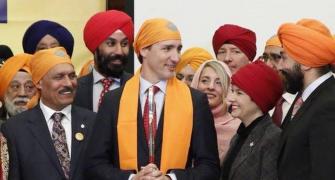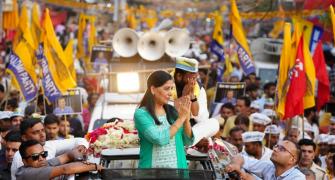 The finance ministry is likely to project economic growth of around eight per cent for the next financial year, compared to a little over seven per cent expected in the current year.
The finance ministry is likely to project economic growth of around eight per cent for the next financial year, compared to a little over seven per cent expected in the current year.Together with the assumption of average inflation easing to around six per cent next year, that would give a nominal GDP expansion of around 14 per cent. On the basis of that, tax collections, fiscal deficit and other targets would be fixed in the Budget.
"We are looking at around eight per cent economic growth for the next fiscal and inflation at six per cent," a key ministry official told Business Standard.
Advance estimates for this financial year, slated to be out in the first week of February, would be factored in while estimating the GDP numbers for 2012-13, according to the official.
The Budget numbers would be based on the size of the Indian economy for 2012-13, calculated from the nominal economic growth over the advance estimates of 2011-12.
For this year, ministry officials do not believe economic growth would go down as low as 6.8 per cent, as predicted by the World Bank.
The officials peg it at a little over seven per cent. They also reject the World Bank's projection that GDP growth would be flat at 6.8 per cent for the next financial year, too.
The 14 per cent nominal GDP growth was also pegged at the time of presentation of the Budget for the current year.
However, the growth break-up was different: nine per cent real GDP growth and five per cent inflation rate. In reality, inflation never came below nine per cent till November.
It, however, fell to 7.47 per cent in December and is expected to come down to around seven per cent by the financial year-end.
Similarly, economic growth moderated to 7.3 per cent in the first half of this year and no-one is expecting it to go anywhere near eight per cent.
Despite a fall in real economic growth, the government's tax collection targets, particularly on the indirect tax front, have not been missed by much, though there could be shortfall in the range of Rs 15,000-20,000 crore (Rs 150-200 billion) in the direct tax mop-up.
An official of the Central Board of Direct Taxes explained that a one per cent fall in the real GDP would shrink direct tax collections by around Rs 10,000 crore (Rs 100 billion). That way, the expected fall in GDP from the projected level of nine per cent in the Budget could at the most lead to a Rs 15,000-20,000 crore (Rs 150-200 billion) of shortfall in the direct tax collections.
The official said corporate income tax, a major part of direct taxes, would come into the picture after companies had paid all indirect taxes and were left with profits.
"So, our role comes at the end of the tax cycle and our collections are affected by factors not in our control," he said.
Direct tax collections, net of refunds, in the first nine months (April-December 2011) stood at Rs 3,23,955 crore (Rs 3.239 trillion), 61 per cent of the Budget estimate of Rs 5,32,651 crore (Rs 5.326 trillion) for 2011-12.
Indirect tax collections went up 16.10 per cent to Rs 2,85,787 crore (Rs 2.857 trillion) during the nine-month period, which is over 70 per cent of the estimate of Rs 3,97,816 crore (Rs 3.978 trillion) for 2011-12.
Indirect tax collections are projected to be in line with the Budget estimate despite the government announcing duty cuts on petroleum products.
At the time of the Budget 2011-12, the tax proceeds were projected to grow 18.50 per cent at Rs 9.32 lakh crore (Rs 9.32 trillion) over the revised estimate of Rs 7.87 lakh crore (Rs 7.87 trillion) for the last financial year.
Of that, direct tax collections were projected to grow by 19.43 per cent and indirect tax collections by 17.36 per cent over Rs 3.39 lakh crore (Rs 3.39 trillion).
The fiscal deficit was targeted to come down to 4.6 per cent of GDP in the current financial year, compared to 4.7 per cent during 2010-11.
However, the deficit touched over 85 per cent of the Budget estimates in just eight months.
The expected fall in direct tax collections, lower disinvestment proceeds, higher expenditure due to rising subsidies and the lower real economic growth rate itself would lead to a rise in the fiscal deficit in proportion to GDP for 2011-12.
http://realtime.rediff.com/instasearch










